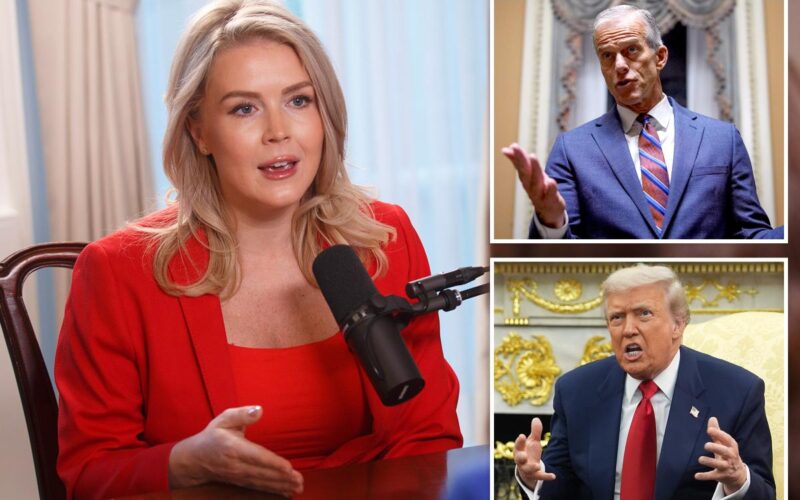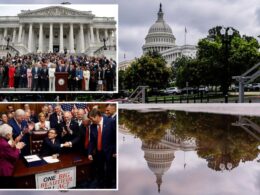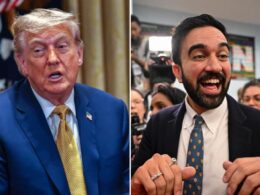White House press secretary Karoline Leavitt doubled down on her calls for the GOP to abolish the filibuster to pass President Trump’s agenda in an interview with “Pod Force One” released Wednesday.
Leavitt argued that much of the president’s efforts to reform federal voting laws in particular would be eased if Senate Republicans agreed to do away with the 60-vote threshold needed to pass most legislation in their chamber.
“Republicans need to get off their butts and move and that’s what the president wants to see them do and that’s what the American people are expecting,” she said.
“There’s so much more work to do — election integrity, voter ID, getting rid of universal mail in ballots — all of that can be done if Congress works together and gets rid of the filibuster,” she added.
“So, the President is definitely talking a lot about that, both publicly and privately. I know he’s expressed his opinion on that to leaders in the Senate who may agree or disagree. We’ll have to see how it shakes out.”
Senate Majority Leader John Thune (R-SD) in his first speech after assuming his position vowed to keep the filibuster.
“They made the Senate smaller and senators’ terms of office longer, with the intention of creating a more stable, more thoughtful, and more deliberative legislative body to check ill-considered or intemperate legislation and protect the rights of the American people,” he said in a Jan. 3 address on the Senate floor.
The 63-year-old Senate GOP leader said the rules of his chamber would be kept to preserve “what our Founders intended” and “ensure that the Senate stays the Senate.”
The filibuster often requires legislation to be considered on a bipartisan basis, given that neither party has held a supermajority in the Senate since the Democrats briefly had the 60 seats needed under former President Barack Obama between April 2009 and February 2010.
Every week, Post columnist Miranda Devine sits down for exclusive and candid conversations with the most influential disruptors in Washington on ‘Pod Force One.’ Subscribe here!
Without the filibuster, legislation could be passed by a simple 51-vote majority, as has been the case for votes on judicial nominees since 2013, due to Democrats’ invoking the “nuclear option” under then-Majority Leader Harry Reid (D-Nev.), and votes on Supreme Court justices since 2017, due to Republicans extending that option under former Majority Leader Mitch McConnell (R-Ky.).
Senate Democrats forced a 43-day government shutdown starting Oct. 1 after refusing to vote with Republicans to break the filibuster. Trump several times urged the GOP to go “nuclear” and scrap the 60-vote legislative threshold to reopen the government.
House Speaker Mike Johnson (R-La.) defended the tool even amid the shutdown as a powerful check on whatever party has the majority in the Senate.
“The filibuster has traditionally been viewed as a very important safeguard,” Johnson said. “If the shoe is on the other foot, I don’t think our team would like it. The Democrats, look, they’ve said what they would do. They would pack the Supreme Court, they would make Puerto Rico and DC states, they would ban firearms.”
Leavitt in a White House press briefing earlier in November said that Democrats “if they are ever given a chance at power again in this city, they will absolutely take away the filibuster from the United States Senate.”
Speaking on “Pod Force One,” the press secretary added that in the meantime “there’s so much that can be accomplished” if Republicans scrap it first and their party should “take advantage of having the most productive president in the Oval Office.”
“It’s not serving the purpose that it originally intended to serve anymore,” she also claimed.
“It’s really a moot point, and he [Trump] wants to see it gone so that he can have the most productive three years of any President ever. He’s already been so productive in his first term. He ushered through the largest middle class tax cut in just six months, which is amazing.”
Vice President JD Vance previously endorsed doing away with the filibuster as well after having served in the Senate briefly from 2022 to 2024 before being tapped as Trump’s running-mate.








